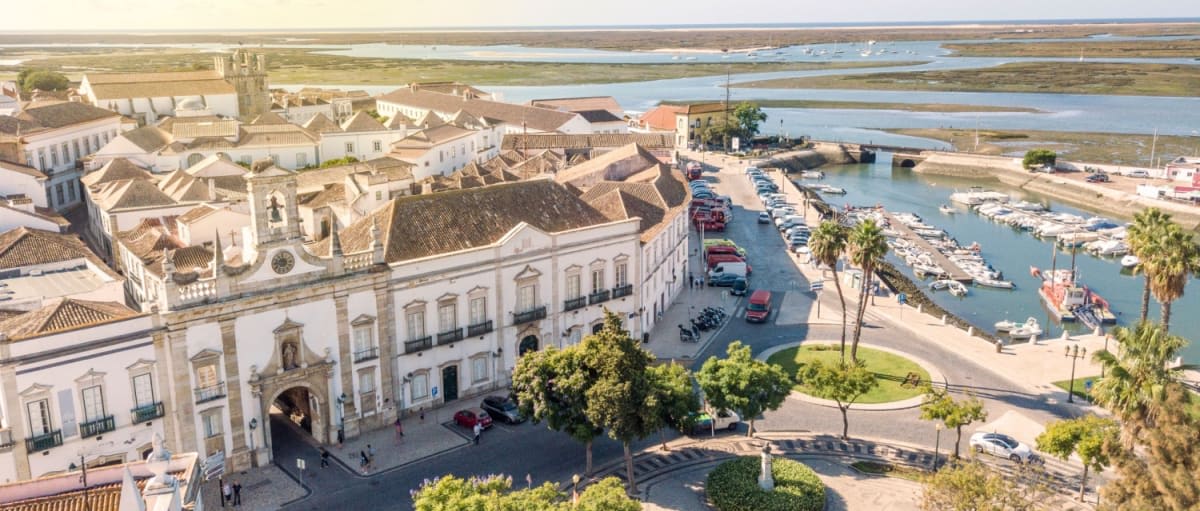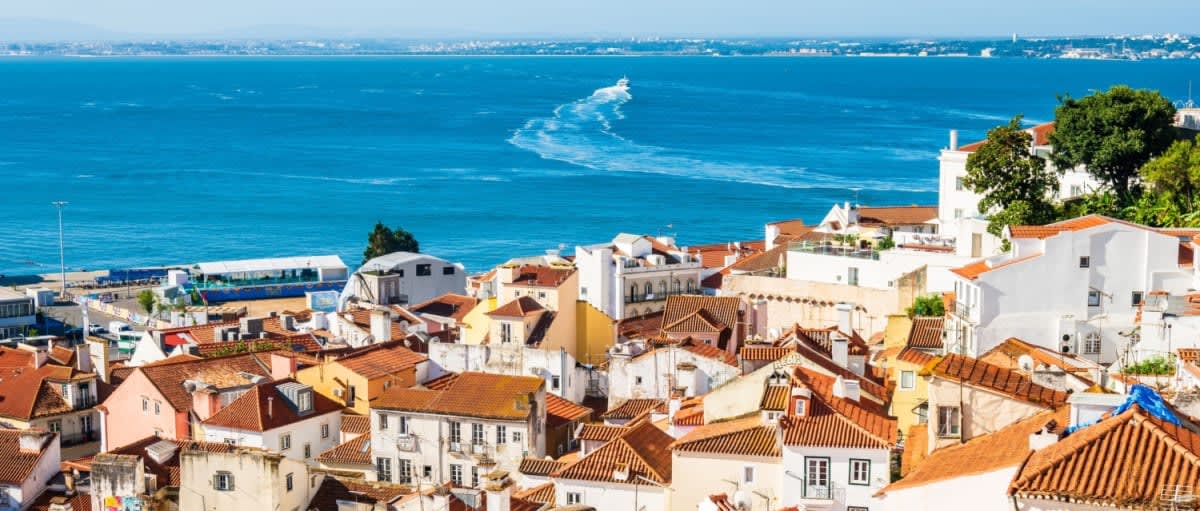If you’re planning to buy a home in Portugal, understanding how property ownership relates to residency is essential. Buying property in Portugal does not automatically entitle you to live there full-time. However, as part of your residency application, demonstrating you have somewhere to live can be useful – and often necessary. Let’s explore the residency requirements for property buyers in Portugal so you know what you’re getting into.
Whether you’re retiring, relocating for work or building a life under the sun, your route to residency will depend on your long-term plans. For 2025 buyers, especially those from outside the EU including the UK, a proper visa strategy is key from the outset.
We outline the main types of visas that can support your move, explaining the residency application process and walks you through what documentation is needed to succeed.
Download the Portugal Buying Guide
Contents

Can you buy property in Portugal without residency?
Yes – Portugal does not impose any residency requirement on foreign property buyers. You can legally purchase a home regardless of your visa status. This means non-EU residents, including UK and US nationals, are free to buy property without living there full-time.
That said, property ownership is not a guaranteed route to live in Portugal. If your goal is to retire or stay long term, you will need to apply for a visa and, eventually, a residency permit. In most cases, proof of accommodation forms part of the visa application process. Owning a property that you intend to live in can therefore be advantageous when applying.
Whether you’re buying a city apartment in Lisbon or a coastal retreat in the Algarve, it’s essential to separate buying property from the right to live there. To live legally in Portugal for more than 90 days in any 180-day period, non-EU citizens must secure the appropriate long-stay visa.
For updates on buyers’ rights and residency status, consult Portugal’s immigration authority – AIMA – or speak to a qualified immigration adviser based in Portugal.
For more details of the purchase process, be sure to claim your free copy of our Portugal buying guide:
Download the Portugal Buying Guide
Understanding Portugal’s visa pathways
Residency requirements for property buyers in Portugal are varied because the government offers several long-stay visas that can lead to residency. These are divided into temporary and permanent categories, depending on your purpose of stay. Some of the most common visa routes include the D7 visa for passive income holders, the D2 visa for entrepreneurs, and the now-discontinued Golden Visa, which still applies under restricted circumstances.
For those looking to retire, live off savings or receive rental or pension income, the D7 visa remains a popular option. It requires evidence of sufficient income to support yourself and any dependants. Employed workers or digital nomads may wish to consider the D8 visa, while business owners can apply via the D2 scheme by setting up or investing in a Portuguese business.
Each visa has its own eligibility rules and supporting documents. However, all are designed for individuals intending to stay in Portugal for more than 12 months, and all can be renewed with a pathway to permanent residence if you meet the criteria.
All residents, temporary or permanent, must register with local authorities and fulfil tax obligations in Portugal once they arrive, particularly if staying more than 183 days per year.
How to apply for a Portuguese visa
Visa applications for Portugal begin in your home country. This first step involves gathering documents, submitting forms and attending an in-person interview at the nearest Portuguese embassy or consulate. For British residents, this typically takes place in London or Manchester, and for US applicants, at the Portuguese consulate corresponding to your home state.
If you’re based in a third country (e.g. you’re American living in the UK), applications must be made from your country of nationality. This rule means applicants often need to return home to begin the visa process.
Most long-term visa applications take six to twelve weeks to process depending on consular workload and the completeness of your information. During this time, consular staff will review your documentation which generally must include income declarations, criminal record checks, proof of health insurance and verified accommodation.
Once approved, you will receive a temporary entry visa valid for four months. You must then travel to Portugal and start the second stage of the process before that visa expires.
Download the golden visa guide
Moving from a visa to residency
Residency requirements for property buyers in Portugal aren’t a one-time deal, either, you can progress from a visa to residency. Once you enter Portugal on your visa, the next stage is converting that permission into a residency permit. This is done through an in-country appointment with AIMA – Agência para a Imigração e Mobilidade (formerly SEF).
You usually have four months from arrival to make this appointment, and it’s best to begin the scheduling process early, as waiting times can vary significantly by region.
At your appointment, you will be asked to present your original application documents again, along with biometric data like fingerprints and photographs. If accepted, your first residency permit is typically valid for two years. It can be renewed if you continue to meet the requirements of your original visa.
It’s essential to maintain eligibility throughout your stay. Not complying with minimum stay periods or failing to renew health coverage or financial statements can affect your right to renew or lead to loss of legal residency.
Residency is a stepping stone towards permanent status or Portuguese citizenship, both of which require five years (in most cases) of continuous legal residence in Portugal.
What documents meet residency requirements for property buyers in Portugal?
To apply for a long-stay visa and later a residency permit in Portugal, you’ll need a comprehensive set of documents. Requirements vary slightly by visa type, but most applicants will need the following:
- Passport: valid for at least three months after your intended stay period ends.
- Proof of accommodation: such as a property deed or rental contract in Portugal.
- NIF number: this is your Portuguese tax identification number, which a lawyer can help secure before you apply.
- Proof of financial resources: recent bank statements, income certificates or pension documents showing you can support yourself while living in Portugal.
- Police clearance certificate: from your country of residence, documenting your clean criminal record.
- Health insurance: approved private cover for at least the first year of residence.
- Visa application form: the correct form must be filled out and signed, along with a passport-sized photo.
Some visas, such as the D2 entrepreneur route, have additional steps – including proof of business incorporation, a local accountant, and business account statements. Visit the Serviço de Estrangeiros e Fronteiras (SEF) website – now merged into AIMA – for up-to-date document checklists and application details.
Choosing the right visa for your needs
Your reasons for moving to Portugal will determine which visa suits you best. Here’s a summary of the most common types:
- D7 visa: for retirees and passive income earners. You must show stable income from pensions, rent or investments.
- D2 visa: for entrepreneurs and start-up founders. Demonstrate your business plan, legal set-up and funds to operate.
- D8 visa: introduced in 2023, this visa is for digital nomads and remote workers. You’ll need a contract or proof of overseas self-employment.
Other routes include student visas, family reunification and research permits. All long-term visas allow you to apply for residency and, eventually, permanent residence or citizenship after five years, depending on conditions.
It’s important to research these thoroughly and seek advice from a licensed immigration specialist, particularly when applying as a family or using business income. The right choice can simplify your application, reduce delays and align with Portuguese legal expectations. We have a full breakdown of the visa and residency options for non-residents in Portugal.
Whatever your visa route, property ownership is an essential support to your application and contributes to your integration in Portugal.
Need personalised help?
Your Overseas Home works with bilingual lawyers, trusted visa advisers and relocation experts across Portugal. If you’re planning to move in 2025, our property consultants can help you match locations to your lifestyle goals, arrange legal support and plan your application.
Book a free consultation with a specialist now and start planning your life in Portugal today.
Understanding the residency process is only part of the journey. If you’re still deciding where to buy property in Portugal, our region-by-region guide can help you compare locations that align with your lifestyle and visa plans. And when you’re ready to proceed, our complete guide on how to buy property in Portugal will walk you through every step of the purchase process with confidence.
Frequently asked questions
Buying property in Portugal does not automatically give you the right to live there full-time. To live legally for more than 90 days, you must apply for a suitable visa and later obtain residency status. Owning property may strengthen your visa application, but it is not sufficient on its own.
The most common long-stay visas include the D7 visa for passive income earners, the D2 visa for entrepreneurs, and the D8 visa for remote workers. Each has specific requirements and allows you to apply for a two-year residency permit once you arrive in Portugal.
While not legally required, hiring a bilingual immigration lawyer is highly recommended. They can help prepare your documentation correctly, avoid errors, and represent you with Portuguese authorities like AIMA. This is especially useful for complex applications or if you’re applying with family or business income.









